

 The background MIDI on this page is
called "Highland Park Fling." (Doesn't this combo
look great playing it? That's me, looking out of place on the
left) I used Voyetra's MIDI Orchestrator Plus and my son's
Roland keyboard to resurrect the simple, energetic jams we
did when I was a teenager in N.E. Los Angeles. Seems like I
was usually the only guy in the group who wasn't Chicano or
Puerto Rican. Of course, my present keyboard musicianship
hardly does justice to the memory...and there's no tamales,
beer, or smell of hyacinth.
The background MIDI on this page is
called "Highland Park Fling." (Doesn't this combo
look great playing it? That's me, looking out of place on the
left) I used Voyetra's MIDI Orchestrator Plus and my son's
Roland keyboard to resurrect the simple, energetic jams we
did when I was a teenager in N.E. Los Angeles. Seems like I
was usually the only guy in the group who wasn't Chicano or
Puerto Rican. Of course, my present keyboard musicianship
hardly does justice to the memory...and there's no tamales,
beer, or smell of hyacinth.
 The first MIDI I
composed is called "I Still Love You," and I do, honest,
Baby. I wrote it to my wife in 1996 using Power Tracks Pro
(see link below).
The first MIDI I
composed is called "I Still Love You," and I do, honest,
Baby. I wrote it to my wife in 1996 using Power Tracks Pro
(see link below).
My Bio
Page background MIDI is called "Hard
to Come By."
It's a simple blues piece in a minor key, nothing more.
Hardly original, but it's me.
"Hypnotech" was an experiment. It
has a techno flavor, kind of mechanistic, yet repeats the
flute motif in a hypnotic way. I wrote it completely by
accident.
My
"big sound" MIDI comes complete with orchestra
hits, tension, and recapitulation...see, I know those words
;-) It's called "Mambo Houz."
"Salsa
Lido"
is part salsa and part nightclub/lounge, not nearly as
upscale as the bay area community the name evokes.
I laid
down the rhythm and background of "Te
Quiero Mas"
to show my mother-in-law how quick and easy it was to
sequence with my keyboard and software. It evolved into a
decent (imho) cha cha.
On my
faith page, there is a really great MIDI as background. You
guessed it, it's not one of mine. It's an excellent jazz
interpretation of the Christmas carol "Oh,
Come Emmanual." I have no idea who did it. If you
know, Email me.
My
newest MIDI is my attempt to capture the flavor of a therapy
exercise that's done with children, called "The
Squiggle Game." The therapist draws a
"squiggle" with a pen, and the kid turns it to art.
I think I captured the flavor of it pretty well. For best
results, use a sound bank with good orchestral patches.
(More
Originals to come)

 First and formost, if you are a performing
musician looking for music to back the cover tunes you play,
you should buy what you need. Trycho
Tunes
are as good as such commercial offerings get, and you inherit
licensing from the original artists for your use of their
song. Their slogan, "MIDI music with the human
touch" is catchy (and true).
First and formost, if you are a performing
musician looking for music to back the cover tunes you play,
you should buy what you need. Trycho
Tunes
are as good as such commercial offerings get, and you inherit
licensing from the original artists for your use of their
song. Their slogan, "MIDI music with the human
touch" is catchy (and true).
 No venture into the world of MIDI should
begin without a visit to The MIDI Farm. They've got it all
"down on the farm," MIDI file and software
downloads, advice, chat, links, and great webpage design. You
can even subscribe to their newsletter!
No venture into the world of MIDI should
begin without a visit to The MIDI Farm. They've got it all
"down on the farm," MIDI file and software
downloads, advice, chat, links, and great webpage design. You
can even subscribe to their newsletter!
 Standard MIDI Files on the
Net
is a small site (and mirror) with connections. It will help
you find and download MIDI files from ftp sites around the
world. Search by filename, description, artist--thousands of
songs from great and accomplished arrangements to the
painfully mediocre.
Standard MIDI Files on the
Net
is a small site (and mirror) with connections. It will help
you find and download MIDI files from ftp sites around the
world. Search by filename, description, artist--thousands of
songs from great and accomplished arrangements to the
painfully mediocre.
 As the intro to this site
says, it contains "SoundFonts, articles, a user forum,
information for software developers and more." HammerSound is an ambitious project
that is well worth the visit, especially for anyone who uses
soundfonts. This site will help make your creative life a bit
easier.
As the intro to this site
says, it contains "SoundFonts, articles, a user forum,
information for software developers and more." HammerSound is an ambitious project
that is well worth the visit, especially for anyone who uses
soundfonts. This site will help make your creative life a bit
easier.
 The Sound Site is an incredible collection
of MIDI originals, MIDI covers, MIDI advice &
instruction, and best of all, hundreds (maybe thousands) of
soundfont files for Soundblaster AWE and Live! cards and
Seers' Reality softsynth.
The Sound Site is an incredible collection
of MIDI originals, MIDI covers, MIDI advice &
instruction, and best of all, hundreds (maybe thousands) of
soundfont files for Soundblaster AWE and Live! cards and
Seers' Reality softsynth.
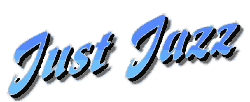 Just Jazz is the finest single
collection of quality jazz MIDIfiles on the web. If you have
a great soundcard, you can download these files and forget
about spending all that money on jazz CDs.
Just Jazz is the finest single
collection of quality jazz MIDIfiles on the web. If you have
a great soundcard, you can download these files and forget
about spending all that money on jazz CDs.
 The MIDI Ring is just fabulous. The Just
Jazz page, above, is one of many fine sites linked together
in this fine project. Start at the first page and follow the
ring, or use the great MIDI site search engine.
The MIDI Ring is just fabulous. The Just
Jazz page, above, is one of many fine sites linked together
in this fine project. Start at the first page and follow the
ring, or use the great MIDI site search engine.
 PG Music. MIDI players and jukeboxes
are a-dime-a-dozen, but real software for writing and
arranging and mini-studio work can really cost you. Not here!
PG Music's Power Tracks Pro Audio for Windows is as close to
free as anything gets these days, and it has most of the
features that normally cost big bucks. If you're a
non-keyboardist just looking for back-up music for your
guitar, sax, whatever, their Band-in-a-Box software is
superb. Power Tracks helped me get started with MIDI. What
makes them so cheap? It's probably because their screen
pictures are grey and one dimensional, but so the F%*# what!
Check them out.
PG Music. MIDI players and jukeboxes
are a-dime-a-dozen, but real software for writing and
arranging and mini-studio work can really cost you. Not here!
PG Music's Power Tracks Pro Audio for Windows is as close to
free as anything gets these days, and it has most of the
features that normally cost big bucks. If you're a
non-keyboardist just looking for back-up music for your
guitar, sax, whatever, their Band-in-a-Box software is
superb. Power Tracks helped me get started with MIDI. What
makes them so cheap? It's probably because their screen
pictures are grey and one dimensional, but so the F%*# what!
Check them out.
 I would be remiss if I didn't include a
link to the designer of my sequencer of choice. If Power
Tracks is the perfect entry level, full featured sequencer,
then Digital Orchestrator Pro is the perfect software for
the beginning professional. User friendly, intuitive, it even
has a built in soundfont manager for Creative Labs
soundcards. Check out the demo.
I would be remiss if I didn't include a
link to the designer of my sequencer of choice. If Power
Tracks is the perfect entry level, full featured sequencer,
then Digital Orchestrator Pro is the perfect software for
the beginning professional. User friendly, intuitive, it even
has a built in soundfont manager for Creative Labs
soundcards. Check out the demo.
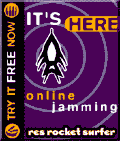 The title, "Res Rocket Surfer" may sound pretty
meaningless, but it is one of the most imaginative and
innovative projects on the web. All I can say is go there,
believe what you read, and try it out. Chatting, jamming,
sharing musical and other ideas. Every chat room is a
recording studio, more than thirty of them last time I
counted...it's great! If you don't think you could use an
"on-line" studio sequencer, listen to my tune
"Tryin' Out" which I composed in
Res Rocket Studio 15.
The title, "Res Rocket Surfer" may sound pretty
meaningless, but it is one of the most imaginative and
innovative projects on the web. All I can say is go there,
believe what you read, and try it out. Chatting, jamming,
sharing musical and other ideas. Every chat room is a
recording studio, more than thirty of them last time I
counted...it's great! If you don't think you could use an
"on-line" studio sequencer, listen to my tune
"Tryin' Out" which I composed in
Res Rocket Studio 15.
 The Creative Inspire website is awesome. You can
say anything you want about Creative Labs customer service,
ok, I will...it stinks, but the effort they put into their
web design on this site merits a link. It's too bad they're
letting this site rot away from neglect (last updated or in
any way attended to by the designer was Jun 99). Like many
things at Creative Labs, if it doesn't sell the newest
product, it's not worth maintaining.
The Creative Inspire website is awesome. You can
say anything you want about Creative Labs customer service,
ok, I will...it stinks, but the effort they put into their
web design on this site merits a link. It's too bad they're
letting this site rot away from neglect (last updated or in
any way attended to by the designer was Jun 99). Like many
things at Creative Labs, if it doesn't sell the newest
product, it's not worth maintaining.
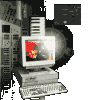 The Internet MIDI Center is a nice site with useful
information for the MIDI beginner. It also has an awesome
on-line jukebox that serves up a huge selection of MIDI
songs. It needs to be seen to be believed.
The Internet MIDI Center is a nice site with useful
information for the MIDI beginner. It also has an awesome
on-line jukebox that serves up a huge selection of MIDI
songs. It needs to be seen to be believed.
 The Microsoft
Network's "Computing Central" Electronic Music pages is a great starting
point for MIDI stuff. From a full array of MIDI and sound
newsgroups, to chat, to interactive jamming, there's not much
missing here. When is AOL going to make its forums accessible
to outside web browsers?
The Microsoft
Network's "Computing Central" Electronic Music pages is a great starting
point for MIDI stuff. From a full array of MIDI and sound
newsgroups, to chat, to interactive jamming, there's not much
missing here. When is AOL going to make its forums accessible
to outside web browsers?
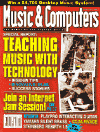 Music and Computers
Magazine
is fairly new on the scene, but they have the best tricks and
tips you can find. Their website has useful stuff, and it is
a good intro to their publication.
Music and Computers
Magazine
is fairly new on the scene, but they have the best tricks and
tips you can find. Their website has useful stuff, and it is
a good intro to their publication.
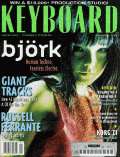 I know I must be sounding like an
advertiser for Miller Freeman Inc. Really, I'm not. They just
have such great websites! Keyboard Magazine has been the information
and trend source for keyboards since the guy at the extreme
left (or right) in the band was called the organist. The
definitive musician magazine site.
I know I must be sounding like an
advertiser for Miller Freeman Inc. Really, I'm not. They just
have such great websites! Keyboard Magazine has been the information
and trend source for keyboards since the guy at the extreme
left (or right) in the band was called the organist. The
definitive musician magazine site.
 Electronic Musician. Who even considered the
term until lately? This magazine defines it and serves those
it defines. So does its website. It's geared toward the high
end user, more digital and studio nowdays than MIDI, but it's
still a source of useful MIDI info. They're pushing the small
studio trend.
Electronic Musician. Who even considered the
term until lately? This magazine defines it and serves those
it defines. So does its website. It's geared toward the high
end user, more digital and studio nowdays than MIDI, but it's
still a source of useful MIDI info. They're pushing the small
studio trend.
 Last, but not least, is
Heir Bomi's "MIDI Papa's WebPage." Bomi (a kind of
achronim of his actual name) is a frequent and prolific
contributer of midi files to the newsgroup alt.binaries.sounds.midi (also a great place to find
or request songs). His webpage is instructive and has great
links. There are no midi files to be downloaded from this
site, per se, but it's worth a visit just to access the
information.
Last, but not least, is
Heir Bomi's "MIDI Papa's WebPage." Bomi (a kind of
achronim of his actual name) is a frequent and prolific
contributer of midi files to the newsgroup alt.binaries.sounds.midi (also a great place to find
or request songs). His webpage is instructive and has great
links. There are no midi files to be downloaded from this
site, per se, but it's worth a visit just to access the
information.